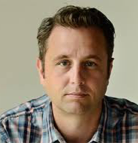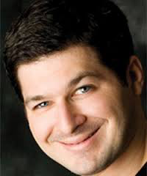Full page
New directions 2016
The inaugural New Directions in the Psychology of Technology Research Conference was held at the University of Southern California in Los Angeles on October 21st and 22nd, 2016. The event was sponsored by the USC Marshall School of Business, with assistance from the UC Berkeley Center for Cybersecurity and USC’s Institute for Creative Technologies.
conference organizers:
Juliana Schroeder, University of California, Berkeley
Nathanael Fast, University of Southern California
Speakers
Maarten Bos, Disney Research
Maarten Bos is a Research Scientist at Disney Research, which is an innovation lab of The Walt Disney Company. He received his Ph.D. in behavioral science from the Radboud University in The Netherlands. Maarten started at Disney Research in 2013, after working as a post-doctoral research fellow at the Harvard Business School. He leads a group of behavioral scientists, with the mission to make people feel better and be better.
Peter Carnevale, University of Southern California
Peter Carnevale studies negotiation and third-party mediation. He has published two books and more than 100 articles in leading scientific and management journals on this topic. Carnevale has served as the President of the International Association for Conflict Management, the premier association of scholars in the study of negotiation and social conflict, and as an adviser on negotiation and organizational conflict to many organizations and governments. His current research investigates the role of emotion expression by artificial humans (e.g., “avatars”) in negotiation.
Elizabeth Dunn, University of British Columbia
Elizabeth Dunn is a professor in the Department of Psychology at the University of British Columbia. Dunn conducts experimental research on self-knowledge and happiness, with a current focus on how mobile technology can both support and undermine human well-being. She is the co-author of “Happy Money: The Science of Happier Spending” (Simon & Schuster) with Dr. Michael Norton.
Jonathan Gratch, University of Southern California’s Institute for Creative Technologies
Jonathan Gratch is the Director for Virtual Human Research at USC’s Institute for Creative Technologies, a Research Full Professor of Computer Science and Psychology at USC and co-director of USC’s Computational Emotion Group. He completed his Ph.D. in Computer Science at the University of Illinois in Urban-Champaign. Dr. Gratch’s research focuses on computational models of human cognitive and social processes, especially emotion, and explores these models’ role in shaping human-computer interactions in virtual environments.
Rosanna Guadagno, University of Texas, Dallas
Rosanna Guadagno is an Associate Professor in Emerging Media and Communication, with a joint appointment as an Associate Professor of Psychology. Her research interests focus on the confluence of three main areas: Social Influence in Mediated Contexts; Psychological Processes in Social Media, Video Games, and Virtual Environments; Gender Roles.
Jeff Hancock, Stanford University
Jeff Hancock is a Professor in the Department of Communication at Stanford University. Hancock and his group work on understanding psychological and interpersonal processes in social media. They specialize in using computational linguistics and experiments to understand how the words can reveal psychological and social dynamics, such as deception and trust, emotional dynamics, intimacy and relationships, and social support.
David Hoffman, Google People Analytics
David Hoffman leads the People Analytics Bets team at Google, which develops products that utilize People Science and Technology to drive quantifiable behavior change in Googlers to improve their productivity, well-being and happiness. David has been at Google with the People Analytics team since 2011 and has used data to influence people policies and programs since 2006, when he joined Capital One’s Workforce Analytics team. David’s work has been featured by The Conference Board in their publication on innovative evidence-based human resources. He is very happy to be applying the skills he learned in the positive psychology-influenced world of Google People Operations, helping people have positive experiences at work. He lives in Palo Alto with his wife (and fellow Googler) Kara, twin daughters Adele and Charlotte, and too many animals.
Andrea Hollingshead, University of Southern California
Andrea B. Hollingshead is Professor of Communication and Associate Dean for Research at the USC Annenberg School for Communication and Journalism. Professor Hollingshead studies the relations between group communication, cognition and performance, and has worked in the area of groups and technology for many years. Her most cited publication is a coauthored book with Joseph E. McGrath: “Groups Interacting with Technology” published in 1994.
Sara Kiesler, Carnegie Mellon University
Sara Kiesler is Hillman Professor of Computer Science and Human Computer Interaction at Carnegie Mellon University. Kiesler applies behavioral and social science methods and theory to technology design, especially to understanding how technologies challenge existing behavior patterns of individuals, groups, and organizations. She conducted among the first scientific studies of computer-mediated communication and early forms of the Internet.
Sara Konrath, Indiana University
Sara Konrath is an Assistant Professor of Philanthropic Studies at the Indiana University Lilly Family School of Philanthropy. She received her Ph.D. in Social Psychology from the University of Michigan in 2007. Konrath is the director of the Interdisciplinary Program on Empathy and Altruism Research (iPEAR), a research lab with a primary focus on motivations, traits, and behaviors relevant to philanthropic giving, volunteering, and other prosocial behaviors. In her current work, she is using mobile phones to implement empathy-building programs.
Ethan Kross, University of Michigan
Ethan Kross is a Professor in the Department of Psychology at the University of Michigan and the Director of the University of Michigan Emotion and Self-Control Laboratory. His research explores how people can control their emotions to improve our understanding of how self-control works, and to discover ways of enhancing self-control in daily life. He adopts an integrative approach to address these issues that draws on multiple disciplines within psychology including social, personality, clinical, developmental, and neuroscience.
Bertram Malle, Brown University
Bertram F. Malle is Professor of Psychology in the Department of Cognitive, Linguistic, and Psychological Sciences at Brown University and Co-Director of the Humanity-Centered Robotics Initiative at Brown. He was trained in psychology, philosophy, and linguistics at the University of Graz, Austria, and received his Ph.D. in Psychology from Stanford University in 1995. His research focuses on social cognition (intentionality, mental state inferences, behavior explanations), moral psychology (cognitive and social blame, guilt, norms), and human-robot interaction (moral competence in robots, socially assistive robotics).
Larry Rosen, California State University, Dominguez Hills
Larry Rosen is Professor Emeritus of Psychology at California State University, Dominguez Hills. He is a research psychologist and is recognized as an international expert in the "Psychology of Technology." Rosen's current research: generational differences in technology/media usage, impact of media on health, the role of technology use in sleep problems, PFC differences in executive functioning, and multitasking in the classroom. The Distracted Mind: Ancient Brains in a High-Tech World (MIT Press with co-author Adam Gazzaley, MD, Ph.D.) is his 7th book on the impact of technology.
Brian Scassellati, Yale University
Brian Scassellati is a Professor of Computer Science, Cognitive Science, and Mechanical Engineering at Yale University and Director of the NSF Expedition on Socially Assistive Robotics. His research focuses on building embodied computational models of human social behavior, especially the developmental progression of early social skills. His other interests include humanoid robots, human-robot interaction, artificial intelligence, machine perception, and social learning.
Ben Waber, Humanyze
Ben Waber is President and CEO of Humanyze, a behavioral analytics company based off of my research. He is also a visiting scientist at the MIT Media Lab, where he received his PhD in the Human Dynamics Group working with Prof. Alex (Sandy) Pentland. Waber was previously a Senior Researcher at Harvard Business School in the Organizational Behavior group. His work centers around using real time data flows to rethink management of people, physical architecture, corporate planning, and training.
CONFERENCE SCHEDULE
FRIDAY OCTOBER 21
12:00pm – Meet at Radisson for box lunch and bus to Institute for Creative Technologies (ICT)
1:30-1:45pm – Introductory remarks at ICT
1:45-2:45pm – Technology at Work
· Maarten Bos, Disney Research, “Behavioral Science at Disney Research”
· Ben Waber, MIT and Humanyze, “People Analytics”
· David Hoffman, Google, “Techy@Work: Leveraging Workplace Data and Technology at Google”
2:45-4:30pm – Tour of USC Institute for Creative Technologies
4:30-5:30pm – Drive back to USC main campus
5:30-6:15pm – Refreshments and conversation at USC Davidson Conference Center
6:15-7:15pm – Technology and the Changing Human Experience
· Larry Rosen, California State University, Dominguez Hills, “Is It the Tech We Use or How We Use Tech That Shapes Our Behaviors?”
· Sara Kiesler, Carnegie Mellon University, “Anonymity in the Era of Online Transparency”
7:30-9:00pm – DINNER at USC Davidson Conference Center
9:00-11:00pm – Drinks and conversation at The Lab Gastropub (optional)
SATURDAY OCTOBER 22
7:00-8:00am – BREAKFAST at the USC Davidson Conference Center
8:15-9:20am – Technology, Smart Living, and Well Being
· Sara Konrath, Indiana University, “Using Mobile Phones to Increase Empathy and Prosocial Behavior”
· Elizabeth Dunn, University of British Columbia, “Digitally Connected, Socially Disconnected: The Consequences of Relying on Technology Rather Than Other People”
· Jeff Hancock, Stanford University, “Social Media Affordances and Well-Being”
9:20-10:00am – Data Blitz Talks and Group Discussion
· Kosta Kushlev, University of Virginia, “Do Smartphones Complement or Compromise the Benefits of Face-to-Face Interactions?”
· Jana Gallus, University of California at Los Angeles, "Fostering Public Good Contributions with Symbolic Awards: A Natural Field Experiment at Wikipedia"
· Roshni Raveendhran, University of Southern California, “Tracked by Technology: We Want Privacy from People But Share Freely With Machines”
10:00-10:30am – BREAK
10:30-12:00pm – Data Blitz Talks and Group Discussion
· Caitlin McCurrie, University of Melborne, “Voice Adds Fuel to the Flame: The Paradoxical Effect of Social-Contextual Cues on Flaming”
· Frank Zheng, UT Austin, “‘Sharing Without Reading’ Leads to Inflated Subjective Knowledge”
· Arthur Jago, Stanford University, “Algorithms and authenticity”
· Michael Yeomans, Harvard University, “Making sense of recommendations”
· David Newman, University of Southern California, “When eliminating bias isn’t fair: Decision-making algorithms and procedural justice”
· Noah Castelo, Columbia University, “Mind Perception in Artificial Intelligence”
· Xuan Zhao, Brown University, “Do People Take a Robot’s Visual Perspective?”
12:00-1:15pm – LUNCH at the USC Davidson Conference Center
1:15-2:15pm – Online Influence
· Rosanna Guadagno, University of Texas, Dallas, “Online Persuasion: Gender Differences and Similarities”
· Andrea Hollingshead, University of Southern California, “Online Social Influence”
· Ethan Kross, University of Michigan, “Online Social Networks and Well-Being: A Case Study on Facebook”
2:15-2:40pm – Group Discussion
2:40-3:10pm – BREAK
3:10-4:30pm – Human Computer Interaction
· Peter Carnevale, University of Southern California, “The Mind in the Machine: Negotiating with People and Computers”
· Jonathan Gratch, USC Institute for Creative Technologies, “It's Only a Computer: Virtual Humans Increase Willingness to Disclose Symptoms of Mental Illness”
· Brian Scassellati, Yale University, “Socially Assistive Robots”
· Bertram Malle, Brown University, “Moral Norms for Robots”
4:30-5:00pm – Closing Comments and Discussion
















